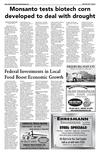19




March 20, 2012 • Page 19
shop online at www.missourivalleyshopper.com
Monsanto tests biotech corn
developed to deal with drought
By BLAKE NICHOLSON
Associated Press
BISMARCK, N.D. —
Seed giant Monsanto Co.
plans large-scale tests this
year of the first governmentapproved biotech crop
developed to deal with
drought.
The new corn is being
introduced as much of the
U.S. remains abnormally dry
and areas in the South and
Southwest still face severe
drought. Monsanto says the
corn won’t be a panacea for
drought-stricken farmers but
when combined with
improved agricultural
practices could help those in
areas like the western Great
Plains, where production
without irrigation can be half
as much as the national
average.
The St. Louis-based
company plans on-farm
trials from South Dakota to
Texas to quantify how well
the corn works before
releasing it commercially
next year. Farmers in areas
like western Kansas, which
gets about half of the annual
rainfall enjoyed by the
eastern half of the state, are
eager for the results.
“We’re not in a very wet
country here,” said Harvey
Heier, who has a farm near
Grainfield, Kan. “It would be
a big plus ... if it works.”
Monsanto developed the
corn with a gene taken from
a bacterium commonly
found in soil and vegetation.
The U.S. Department of
Agriculture decided against
regulating it late last year,
essentially approving it for
commercial release. The
decision is notable because it
marks the first time USDA’s
Animal and Plant Health
Inspection Service has
approved a product that has
been genetically engineered
to resist drought, rather than
a pest or herbicide.
The agency says the corn
is safe. Its analysis concluded
the corn wasn’t likely to
harm the environment,
people or animals and
wouldn’t boost corn
production at the expense of
grasslands and forest, said
Michael Gregoire, deputy
administrator of APHIS’s
Biotechnology Regulatory
Services.
Doug Gurian-Sherman,
senior scientist for the Union
of Concerned Scientists’
Food and Environment
Program, said there’s no
reason to think the corn
might be unsafe, though he
and Bill Freese at the Center
for Food Safety say they wish
there were more stringent
testing and regulation of
biotech crops. USDA said
last November that it plans
to speed up regulatory
reviews of biotech crops
even more by streamlining
the process, cutting in half
the average approval time of
three years. New guidelines
could be published as early
as this month.
Officials in the corn and
ethanol industries say
drought-tolerant corn could
help meet the dramatic
increase in demand for the
grain used to make both
food and fuel. Public
consumption of corn-based
products has more than
doubled in the past 30 years,
while the ethanol industry’s
demand for corn has
doubled in the past five
years, according to the
USDA and Renewable Fuels
Association.
It’s not clear whether
Monsanto’s corn will actually
boost production. The
APHIS analysis prepared by
Gregoire says field trial
results showing more corn
grown per acre under dry
conditions aren’t statistically
significant but suggest the
corn would do well in
drought.
But the analysis also notes
some conventionally bred
varieties have drought
tolerance and “to some
extent, all U.S. corn varieties
have been becoming more
drought resistant over time.”
Companies such as
Pioneer Hi-Bred, a DuPont
business, have introduced
drought-tolerant corn
developed through
conventional and molecular
breeding. No company but
Monsanto has petitioned
APHIS for approval of a
genetically engineered
Federal Investments in Local
Food Boost Economic Growth
Recently the USDA
released a comprehensive
report on its Know Your
Farmer, Know Your Food
initiative, launched in 2009
to enhance coordination
among federal programs that
in various ways help to build
local and regional farm and
food systems.
“This is a very timely
report,” notes Helen
Dombalis, Policy Associate
with the National
Sustainable Agriculture
Coalition. “The ongoing
revitalization of regional
farm and food systems
depends on the continuation
of key 2008 Farm Bill
programs whose funding
expires later this year if
Congress does not act.”
The expiring farm bill
programs range from ValueAdded Producer Grants,
which help farmers develop
new products and markets
while increasing their share
of the consumer food dollar,
to the Farmers Market
Promotion Program, which
helps create and expand
venues for direct farmer-toconsumer sales of local
foods.
Also up for farm bill
funding renewal are the
Rural Micro-Entrepreneur
Assistance Program,
National Organic
Certification Cost Share
Program, Beginning Farmer
and Rancher Development
Program, Outreach and
Assistance for Socially
Disadvantaged Farmers and
Ranchers, Rural Energy for
America Program, Organic
Agriculture Research and
Extension Initiative, and
Specialty Crop Research
Initiative.
“Congress should renew
and expand funding for
these innovative programs in
the 2012 Farm Bill,” says
Dombalis. “Local and
regional agriculture is a
major new driver in the farm
economy. There are very
significant emerging market
and business opportunities,
but major research,
infrastructure, and technical
assistance gaps need to be
filled to reap the full benefit.
We need all of the existing
farm bill tools available in
the future to grow rural jobs
and to increase new farming
opportunities.”
Several bills pending in
Congress, including the
Local Farms, Food, and Jobs
Act and the Beginning
Farmer and Rancher
Opportunity Act, include
provisions to renew funding
for these vital programs and
to ensure our federal
agriculture policy meets the
needs of local and regional
producers. Both bills are
aimed at inclusion in the
2012 Farm Bill and have the
support of hundreds of farm,
food, and rural organizations
nationwide.
Report Contents and the
Compass
Know Your Farmer,
Know Your Food’s primary
goals revolve around better
using federal resources to
boost job creation through a
modernization of local and
regional farm and food
economies. The report
details a case study in
northeastern Iowa where
local food sales catapulted
more than one thousand
percent in just four years and
another in Oklahoma where
a group of producers are
aggregating, labeling, and
cooperatively marketing
$70,000 worth of food a
month statewide to create an
extra income stream.
COMPLETE TRUCK REPAIR
• FARM TRUCKS - ALL SIZES
• SEMI TRUCKS & TRAILERS
Friendly, Honest Repair
TOP QUALITY SERVICE
Over 35 Years
Experience
VARILEK TRUCK REPAIR, INC.
3507 East Hwy. 50, Yankton, SD
1-605-665-1447 or Toll Free: 1-888-665-1447
Similar economic ripple
effects to improve farm and
rural income are found
throughout the report.
Food access also plays
prominently into the
initiative’s priorities, which
include programs to localize
food processing and
distribution in ways that
reach underserved
communities. The USDA
Farm to School team has
helped spur programs that
have increased students’
fresh fruit and vegetable
consumption by 25 to 84
percent, and Know Your
Farmer has also coordinated
research to support the
development of new “food
hubs” which facilitate
growers’ access to local
markets and fair prices.
drought-tolerant trait,
spokesman R. Andre Bell
said.
While Monsanto touts
the variety developed with
German chemical company
BASF as “the industry’s first
biotech drought solution,” it’s
also been careful to limit
expectations. The corn,
which is being marketed
under the name
DroughtGard, is aimed at
areas of the U.S. suffering
moderate drought and is not
currently part of the
company’s effort to help
bring drought-tolerant corn
to parched areas of Africa.
“This isn’t a product that
we’re expecting to grow in
the desert,” Monsanto
spokeswoman Danielle
Stuart said. “You still need
water and nutrients.”
Mark Edge, Monsanto’s
drought marketing specialist,
cautioned that while field
trials were promising, they
were limited. This year’s
tests, involving as many as
250 growers in six states,
should provide better
information about where
and how well it works, he
said.
“We don’t see this as an
end; this is a beginning to
understanding how we can
use the tools of
biotechnology to interact in
this complex arena of yield
and (drought) stress,” Edge
said. “We expect that our
pipeline will have many
more (products) that we
bring forward.”
Gurian-Sherman
predicted the corn will be “a
Band-Aid, not a cure,”
providing “modest” benefit
on only about one-fifth of
the U.S. corn acres that are in
areas of frequent drought.
“I don’t think it’s useless
technology ... (but) we
shouldn’t have an
expectation that this
technology is going to solve
our drought problems in the
foreseeable future — at least
severe droughts,” he said.
Phone: 605-267-4426
www.freeburghay.com
605-665-9012
toll free 1-877-ferdigs (337-3447)
220 East 3rd St., Yankton, SD 57078
www.ferdigstransmission.com
EHRESMANN
ENGINEERING
For All Your
Steel Needs!
STEEL SPECIALS
• Flat Bars • Solid Bars • Angle Iron •Channel Iron
• Round, Square & Retangle Tubing
• Many More types of steel to choose from
We Want to be Your Steel Supplier
Call us at 605-665-7532
4400 W. 31st St., Yankton, SD 57078





























 Previous Page
Previous Page





